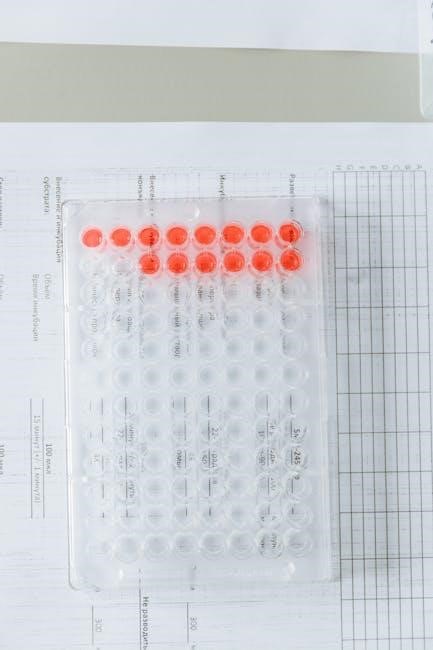The Gottman Method, developed by Dr. John Gottman, is a research-based approach to improving relationships through trust, respect, and positive communication, offering evidence-based strategies for couples therapy.
1.1 Overview of the Gottman Method
The Gottman Method is a research-based approach to couples therapy developed by Dr; John Gottman and his wife, Dr. Julie Gottman. It focuses on building trust, respect, and positive communication to strengthen relationships. The method emphasizes understanding each partner’s emotional needs and fostering a deeper connection. By using practical strategies and exercises, it helps couples navigate challenges and create a resilient, fulfilling relationship. This approach is grounded in decades of relationship research and is widely recognized for its effectiveness.
1.2 Importance of the Gottman Method in Couples Therapy
The Gottman Method is highly valued in couples therapy for its evidence-based techniques that improve relationship satisfaction. It addresses core issues like communication, trust, and emotional connection, offering practical tools for conflict resolution. By focusing on understanding and empathy, it helps couples build a stronger foundation, making it an essential approach for therapists and couples seeking lasting change and relationship growth.

Core Principles of the Gottman Method
The Gottman Method emphasizes trust, respect, and positive communication as foundational elements. It fosters fondness, admiration, and emotional connection, guiding couples toward healthier, more fulfilling relationships.
2.1 The Role of Trust and Respect in Relationships
Trust and respect are cornerstones of the Gottman Method, fostering a secure and supportive relationship environment. They promote emotional attunement, allowing couples to navigate conflicts effectively and sustain intimacy. Without trust, relationships often deteriorate, while respect ensures mutual appreciation and understanding. Gottman emphasizes that these elements are vital for long-term satisfaction and stability, encouraging partners to prioritize reliability and admiration in their interactions. This foundation strengthens resilience against challenges, ensuring enduring love and connection.
2.2 Fondness and Admiration as Key Elements
Fondness and admiration are essential for a fulfilling relationship, as they foster a positive emotional connection. Gottman emphasizes that these qualities help couples maintain a strong bond and navigate challenges together. When partners actively express appreciation and admiration, it strengthens their relationship’s foundation. The absence of these elements can lead to emotional distance and dissatisfaction. Practicing gratitude and regularly acknowledging each other’s strengths are powerful ways to cultivate fondness and admiration, ensuring a lasting and joyful partnership. These elements are vital for relationship longevity.
Positive communication is crucial in the Gottman Method, focusing on active listening, empathy, and constructive expression of emotions. Couples are encouraged to use “I” statements to avoid blame and defensiveness. Gottman’s approach emphasizes the importance of turning toward each other during conflicts, fostering understanding and connection. Regular expressions of appreciation and affection also strengthen communication. By practicing these strategies, couples can build trust, resolve conflicts effectively, and maintain a supportive relationship. These techniques are designed to enhance emotional intimacy and promote long-term relationship satisfaction. The Sound Relationship House Theory, developed by John Gottman, is a foundational framework for building and maintaining healthy relationships. It emphasizes creating love maps, sharing fondness, and turning toward each other to foster connection and manage conflicts effectively. Building Love Maps is a core concept in the Gottman Method, emphasizing the importance of understanding your partner’s inner world. It involves creating a mental map of their thoughts, feelings, and experiences. This practice fosters emotional connection and intimacy, helping couples stay attuned to each other’s needs. By regularly updating these maps, partners can navigate conflicts more effectively and strengthen their relationship foundation. Love Maps are a powerful tool for sustaining long-term marital satisfaction and resilience. Sharing fondness and admiration is a cornerstone of the Gottman Method, fostering a positive emotional climate in relationships. By regularly expressing appreciation and affection, couples cultivate a culture of respect and warmth. This practice helps partners maintain a favorable view of each other, even during conflicts. Small, consistent expressions of fondness and admiration strengthen emotional bonds and prevent the erosion of intimacy. It is a simple yet powerful way to nurture connection and sustain long-term relationship satisfaction. Turning toward instead of away is a vital principle in the Gottman Method, emphasizing the importance of connection and engagement in relationships. When partners consistently respond to each other’s bids for attention, they build a strong foundation of intimacy and trust. This practice fosters emotional closeness and strengthens the bond, helping couples navigate conflicts more effectively. By prioritizing connection, partners create a culture of responsiveness, which is essential for a fulfilling and resilient relationship. Solvable problems are situational and can be addressed with compromise, while perpetual issues stem from core differences, requiring acceptance and understanding rather than resolution. Solvable problems are specific, situational, and often arise from current circumstances. They can be addressed with compromise and effective communication strategies. According to Gottman, these issues do not involve deep-seated conflicts or core differences. Couples can identify solvable problems by assessing areas of their relationship that are not deeply personal or historical. Tools like the Gottman 19 Areas Checklist help pinpoint these issues, allowing couples to focus on actionable solutions and foster cooperation and understanding. Perpetual problems are deeply ingrained issues tied to core differences in personality, values, or lifestyle. They are not situational but rooted in who each partner is. Unlike solvable problems, these are not about specific circumstances but about fundamental aspects of the relationship. Perpetual problems often involve recurring conflicts and may not have a clear resolution. Acceptance and learning to navigate these differences become key, as they are unlikely to change over time. Managing perpetual issues requires acceptance and finding ways to live with differences. Couples can reduce conflict by understanding each other’s perspectives and focusing on shared goals. Strategies include compromise, humor, and creating rituals of connection; Acceptance and empathy help mitigate tension, fostering a deeper understanding of each partner’s needs. By addressing the emotional core of issues and building resilience, couples can navigate perpetual problems effectively, strengthening their relationship over time; John Gottman outlines seven principles to strengthen marriages, including enhancing love maps, nurturing fondness, turning toward each other, and overcoming gridlock, fostering lasting relationship satisfaction. Enhancing love maps involves actively seeking to understand your partner’s inner world, including their thoughts, feelings, and experiences. This principle emphasizes building and updating mental maps of your partner’s life, fostering emotional intimacy. By regularly engaging in conversations about hopes, fears, and dreams, couples create a deeper connection. The Gottman Love Map Exercise encourages partners to explore each other’s worlds, ensuring they stay attuned to changes and remain emotionally connected, which is vital for relationship stability and satisfaction. Nurturing fondness and admiration is crucial for fostering a positive emotional climate in relationships. By regularly expressing appreciation and recognizing each other’s strengths, couples build resilience against conflict. The Gottman Method emphasizes small, consistent gestures, such as heartfelt compliments or gratitude practices, to maintain affection and respect. This practice helps partners reconnect with the reasons they fell in love, strengthening their bond and creating a foundation of mutual support and warmth in their relationship. Turning toward each other strengthens emotional connections by fostering intimacy and understanding. The Gottman Method encourages partners to engage in small, meaningful interactions, such as sharing thoughts, feelings, and desires. This practice helps build trust and ensures both individuals feel valued and heard; By actively choosing to turn toward rather than away, couples cultivate a deeper sense of closeness and support, which is vital for navigating life’s challenges together and maintaining a fulfilling relationship over time. Allowing your partner to influence you fosters collaboration and mutual respect, enhancing relationship satisfaction. The Gottman Method emphasizes the importance of openness to your partner’s perspectives and needs, ensuring that both voices are heard and valued in decision-making. By embracing influence, couples develop a stronger sense of unity and shared purpose, which helps navigate conflicts and build a resilient, harmonious partnership. This principle encourages equality and teamwork, promoting a healthier and more fulfilling relationship dynamic. The Gottman Method distinguishes between solvable and perpetual problems, emphasizing effective strategies for addressing conflicts that can be resolved. Couples are encouraged to approach solvable issues with compromise, understanding, and positive communication. By addressing emotions calmly and seeking mutually beneficial solutions, partners can strengthen their relationship. This principle highlights the importance of problem-solving skills and collaboration, fostering a culture of resolution and unity in navigating day-to-day challenges together. Overcoming gridlock involves addressing perpetual issues that feel insurmountable. The Gottman Method suggests understanding each partner’s perspective, acknowledging emotions, and seeking compromises. By fostering empathy and collaboration, couples can move past gridlock. This approach encourages open dialogue, mutual respect, and creative solutions to break the stalemate. It’s about transforming conflicts into opportunities for deeper connection and shared growth, ensuring both partners feel heard and valued in the relationship. Creating shared meaning involves building a life together that reflects both partners’ values, goals, and beliefs. It’s about moving beyond individual needs to foster a collective sense of purpose. This principle encourages couples to create rituals, share dreams, and align their visions for the future. By doing so, they cultivate a deeper emotional connection and a sense of unity. Shared meaning strengthens the bond, helping couples navigate life’s challenges with a shared sense of direction and purpose. Emotion Coaching teaches partners to guide each other in understanding and managing emotions, fostering emotional awareness, validation, and constructive expression to strengthen the relationship. Emotion Coaching is a tool within the Gottman Method that helps individuals understand and manage emotions effectively. It involves validating feelings, fostering emotional awareness, and encouraging constructive expression. By teaching partners and parents to guide each other through emotional challenges, it promotes empathy and connection. This approach emphasizes the importance of emotional intelligence in building resilient relationships, allowing individuals to navigate conflicts with understanding and support. It also helps parents model healthy emotional regulation for their children, fostering long-term emotional well-being and stronger family bonds. Teaching emotional intelligence is a cornerstone of the Gottman Method, focusing on enhancing self-awareness, empathy, and effective communication. It encourages individuals to recognize and understand their emotions, as well as those of their partners and children. By fostering emotional intelligence, couples and parents can address conflicts constructively and build deeper connections. This skill is vital for creating a supportive environment where emotions are validated, leading to stronger, more resilient relationships and improved overall well-being for all family members involved in the process. The Gottman Method extends its benefits to parenting, emphasizing emotional coaching to help children develop resilience and emotional intelligence. Parents learn to guide their children through emotions, fostering a supportive environment. In relationships, this approach strengthens bonds by promoting understanding and empathy. By applying these principles, families and couples can navigate challenges effectively, creating lasting harmony and connection. These applications highlight the versatility of the Gottman Method in nurturing healthy relationships across various life stages and dynamics. The Gottman Method offers exercises like the Love Map, 19 Areas Checklist, Six-Second Kiss, and “I Appreciate” Activity to enhance connection, intimacy, and communication in relationships. The Gottman Love Map Exercise helps couples strengthen their emotional connection by creating mental maps of each other’s worlds. It involves answering questions about preferences, concerns, and aspirations to foster intimacy and understanding. Regular practice ensures partners stay attuned to changes in each other’s lives, enhancing relationship stability and satisfaction. This exercise is a cornerstone of the Gottman Method, promoting a deeper sense of closeness and connection. The Gottman 19 Areas Checklist is a practical tool designed to help couples assess their relationship across 19 specific areas, such as communication, intimacy, and conflict resolution. Each area is evaluated to determine if it’s currently fine or needs improvement. This exercise encourages open dialogue and provides a clear framework for identifying strengths and areas requiring attention, fostering constructive growth and understanding within the relationship. Regular use of this checklist can help couples maintain a healthy and fulfilling partnership. The Six-Second Kiss is a simple yet effective exercise recommended by the Gottman Method to foster intimacy and connection in relationships. By focusing on a brief, meaningful kiss, couples can rekindle affection and create a moment of emotional closeness. This practice encourages partners to pause from daily distractions and reconnect, reinforcing their bond and enhancing fondness and admiration for each other, which are essential for a fulfilling relationship. Regular implementation can lead to increased emotional and physical closeness over time. The “I Appreciate” activity, part of the Gottman Method, encourages couples to reflect on and express gratitude for their partner. By listing three or more things they appreciate, partners reconnect and strengthen their bond. This practice fosters a positive emotional climate, helping couples shift focus from conflicts to shared joy and admiration. Regularly practicing this exercise cultivates fondness, intimacy, and a deeper understanding of each other, which are vital for a resilient and fulfilling relationship. The Gottman Method is rooted in decades of research, including studies conducted in the “Love Lab,” where couples’ interactions were physiologically monitored. Time-series analysis revealed predictors of relationship success, forming the basis of this evidence-based approach. Dr. John Gottman’s “Love Lab” revolutionized relationship research by studying couples’ interactions in a controlled environment; Physiological data, such as heart rates and facial expressions, were monitored to identify patterns in successful and failing relationships. Gottman developed a system to classify positive and negative interactions, revealing key predictors of relationship stability. His findings introduced concepts like the “Four Horsemen” of conflict and the importance of emotional attunement, laying the foundation for the Gottman Method’s evidence-based strategies. John Gottman applied time-series analysis to study relationship dynamics, enabling researchers to track interactions over time. This method helped identify patterns in dominance, emotional responsiveness, and conflict resolution. By analyzing sequential data, Gottman developed tools to predict relationship outcomes, such as the likelihood of divorce. His work with James Ringland advanced techniques for understanding bi-directional influence in couples, providing a robust framework for assessing relationship health and informing therapeutic interventions. The Gottman Method’s real-life applications include case studies, success stories, and inspiring films like “Love Birds.” Resources like Gottman Love Notes and monthly downloads support couples, fostering healthy relationships and emotional connections through practical tools and community engagement. The Gottman Method has inspired real-life applications, such as the film “Love Birds,” which follows a couple reconnecting through Gottman principles. Case studies highlight couples like Krishna and Milana, who successfully improved their relationship using Gottman tools like the Love Map Exercise and the 19 Areas Checklist. These success stories demonstrate how the Gottman Method fosters emotional connection and trust, helping couples navigate challenges and build lasting relationships through evidence-based strategies and practical exercises. The film “Love Birds” tells the story of Krishna and Milana, a real-life couple who reconnect one year after their wedding. Inspired by the Gottman Method, the film highlights how principles like increasing fondness and admiration helped them rebuild their relationship. It showcases practical Gottman exercises, such as the Love Map Exercise, demonstrating how these tools fostering emotional connection and trust. The film serves as a testament to the Gottman Method’s ability to guide couples toward meaningful and lasting relationships through evidence-based strategies. Enhanced trust, improved communication, and effective conflict resolution are key benefits, fostering emotional intelligence and strengthening relationships through proven evidence-based strategies like the Gottman Method. The Gottman Method significantly enhances relationship satisfaction by fostering trust and respect. Couples learn to build love maps, share fondness, and communicate effectively, reducing conflict and increasing intimacy. These strategies, rooted in research, help partners understand each other’s needs, leading to a deeper emotional connection and a more fulfilling relationship. By addressing both solvable and perpetual issues, the method ensures long-term happiness and stability in partnerships. The Gottman Method emphasizes building trust and improving communication through active listening and emotional attunement. Couples learn to express needs clearly and respond empathetically, fostering a deeper connection. Techniques like turning toward each other and sharing fondness strengthen trust, while addressing conflicts constructively prevents resentment. By enhancing communication, partners create a secure relationship environment, leading to increased intimacy and mutual understanding. These strategies help couples navigate challenges while maintaining a strong emotional bond. The Gottman Institute offers free monthly downloads, including exercises like the Gottman Love Map and the “I Appreciate” activity, to strengthen relationships through practical tools. The Gottman Love Notes Community provides free monthly downloads, offering couples practical tools to strengthen their relationships. Resources include the Gottman Love Map Exercise, the 19 Areas Checklist, and the “I Appreciate” activity. These exercises help partners reconnect and nurture fondness and admiration. By joining the community, couples gain access to evidence-based materials designed to enhance communication and trust. The Gottman Institute ensures these resources are accessible to all, fostering healthier relationships worldwide through education and support. The Gottman Institute offers free monthly downloads designed to strengthen relationships. These resources include exercises like the Six-Second Kiss and “I Appreciate” lists, fostering connection and gratitude. Couples gain tools to enhance communication, trust, and intimacy. Each download aligns with the Gottman Method’s evidence-based approach, providing practical strategies for relationship growth. By offering these materials, the institute makes relationship improvement accessible to all, helping couples build stronger, more fulfilling partnerships rooted in research and real-world application. The Gottman Method offers an evidence-based approach to strengthening relationships, emphasizing trust, communication, and intimacy. Its practical strategies and tools empower couples to build lasting harmony and connection. The Gottman Method is an evidence-based approach to improving relationships, focusing on trust, respect, and positive communication. It emphasizes building love maps, fostering fondness and admiration, and effectively managing conflicts. The Seven Principles for Making Marriage Work provide a framework for couples to enhance their connection. Practical exercises like the Love Map Exercise and the 19 Areas Checklist help couples strengthen their bond. By addressing both solvable and perpetual issues, the Gottman Method offers tools for lasting relationship satisfaction and emotional intimacy. The Gottman Method stands as a powerful, evidence-based approach to fostering healthy relationships, emphasizing trust, respect, and effective communication. By providing practical strategies and exercises, it empowers couples to build and maintain meaningful connections. Its focus on addressing both solvable and perpetual issues ensures long-term relationship satisfaction. With resources like PDF guides widely available, the Gottman Method remains an accessible and invaluable tool for nurturing emotional intimacy and strengthening partnerships.2.3 Positive Communication Strategies

The Sound Relationship House Theory
3.1 Building Love Maps
3.2 Sharing Fondness and Admiration
3.3 Turning Toward Instead of Away

Solvable vs. Perpetual Problems
4.1 Identifying Solvable Problems
4.2 Understanding Perpetual Problems
4.3 Strategies for Managing Perpetual Issues
The Seven Principles for Making Marriage Work
5.1 Enhancing Your Love Maps
5.2 Nurturing Fondness and Admiration
5.3 Turning Toward Each Other
5.4 Letting Your Partner Influence You
5.5 Solving Your Solvable Conflicts
5.6 Overcoming Gridlock
5.7 Creating Shared Meaning

Emotion Coaching and Its Role
6.1 The Concept of Emotion Coaching
6.2 Teaching Emotional Intelligence
6.3 applications in Parenting and Relationships
6.3 Applications in Parenting and Relationships

Exercises and Activities
7.1 The Gottman Love Map Exercise
7.2 The Gottman 19 Areas Checklist
7.3 The Six-Second Kiss
7.4 “I Appreciate” Activity

The Science Behind the Gottman Method
8.1 The Love Lab and Its Findings
8.2 Time-Series Analysis in Relationship Research

Real-Life Applications
9.1 Case Studies and Success Stories
9.2 The Film “Love Birds” and Its Inspiration

Benefits of the Gottman Method
10.1 Improving Relationship Satisfaction
10.2 Enhancing Communication and Trust

Free Resources and Downloads
11.1 Gottman Love Notes Community
11.2 Monthly Downloads for Couples
12.1 Summary of Key Points
12.2 Final Thoughts on the Gottman Method